Recycling Waste: China's Ban on Australia's Recyclables
VerifiedAdded on 2023/01/10
|12
|3054
|20
Report
AI Summary
This report examines the impact of China's ban on Australia's recycling waste, employing a systems thinking approach to analyze the complexities of the situation. It begins by comparing traditional and systems thinking methodologies, highlighting the advantages of the latter in addressing complex sustainability issues. The report then delves into the factors behind China's ban, including concerns about waste purity, the susceptibility of recycling markets, and the global environmental effects. It explores the shift towards a circular economy and the potential for increased consumption of virgin plastics. The report concludes by reflecting on the benefits of systems thinking in understanding the implications of China's decision and the need for innovative solutions to manage waste effectively, advocating for a move away from solely focusing on recycling rates and towards high-quality recyclables and circular economic models.
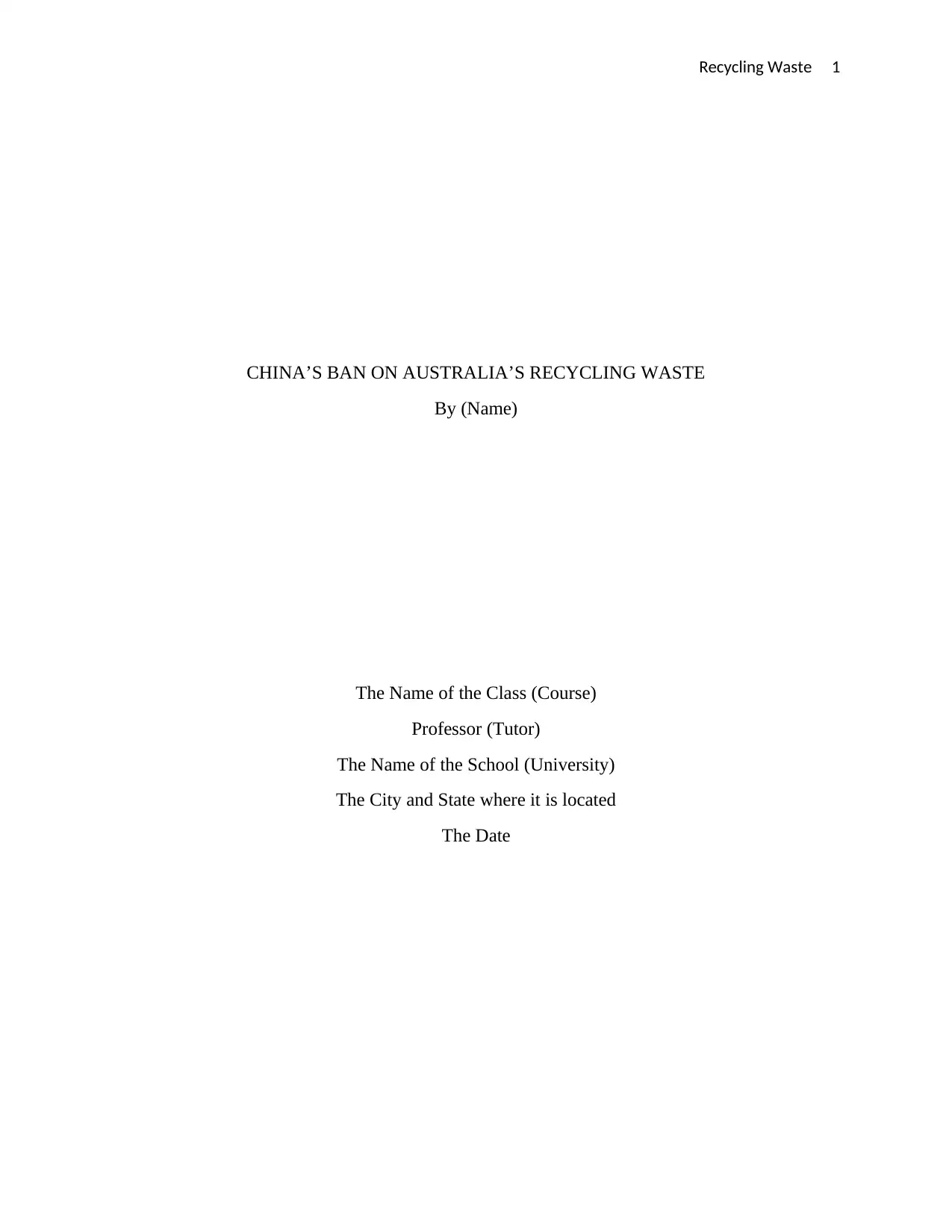
Recycling Waste 1
CHINA’S BAN ON AUSTRALIA’S RECYCLING WASTE
By (Name)
The Name of the Class (Course)
Professor (Tutor)
The Name of the School (University)
The City and State where it is located
The Date
CHINA’S BAN ON AUSTRALIA’S RECYCLING WASTE
By (Name)
The Name of the Class (Course)
Professor (Tutor)
The Name of the School (University)
The City and State where it is located
The Date
Paraphrase This Document
Need a fresh take? Get an instant paraphrase of this document with our AI Paraphraser
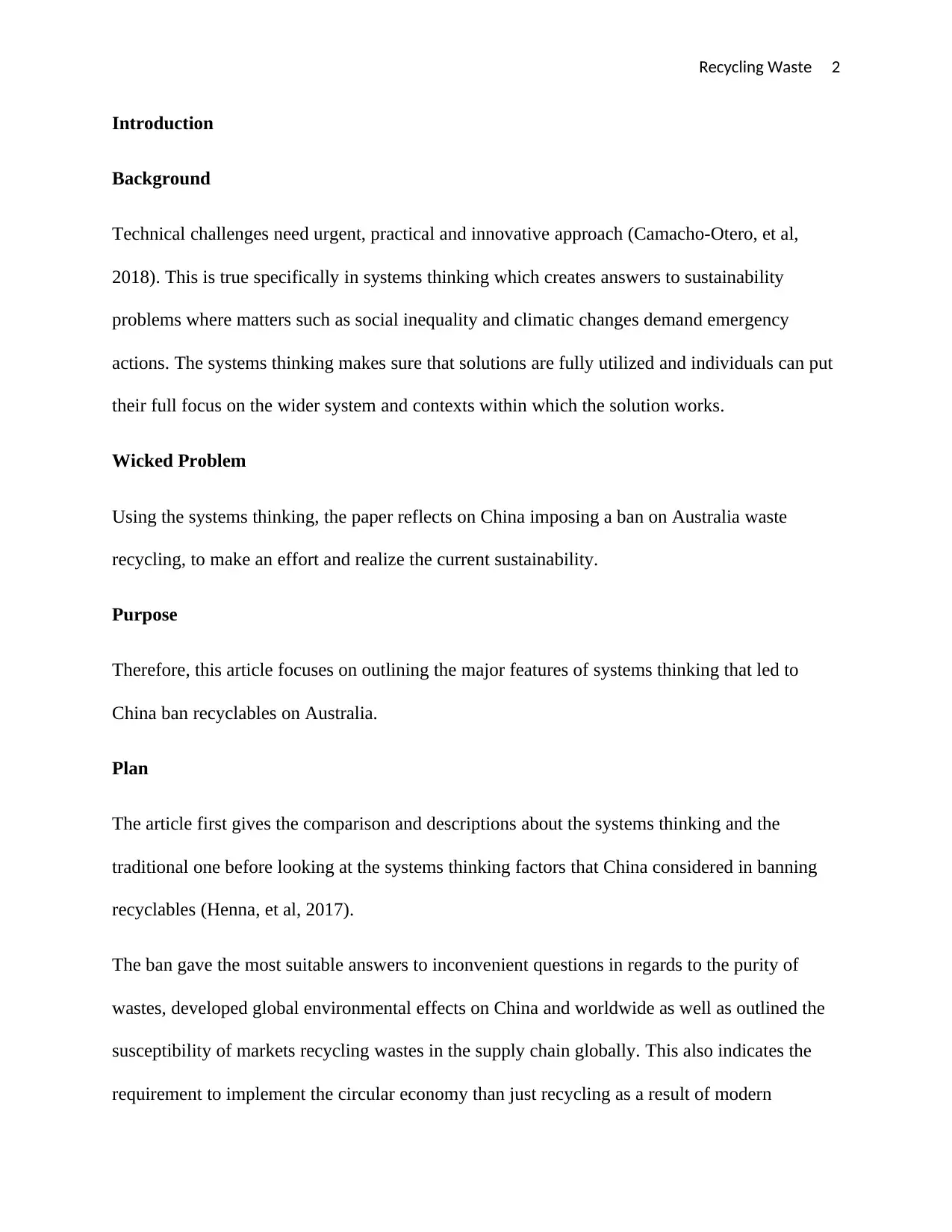
Recycling Waste 2
Introduction
Background
Technical challenges need urgent, practical and innovative approach (Camacho-Otero, et al,
2018). This is true specifically in systems thinking which creates answers to sustainability
problems where matters such as social inequality and climatic changes demand emergency
actions. The systems thinking makes sure that solutions are fully utilized and individuals can put
their full focus on the wider system and contexts within which the solution works.
Wicked Problem
Using the systems thinking, the paper reflects on China imposing a ban on Australia waste
recycling, to make an effort and realize the current sustainability.
Purpose
Therefore, this article focuses on outlining the major features of systems thinking that led to
China ban recyclables on Australia.
Plan
The article first gives the comparison and descriptions about the systems thinking and the
traditional one before looking at the systems thinking factors that China considered in banning
recyclables (Henna, et al, 2017).
The ban gave the most suitable answers to inconvenient questions in regards to the purity of
wastes, developed global environmental effects on China and worldwide as well as outlined the
susceptibility of markets recycling wastes in the supply chain globally. This also indicates the
requirement to implement the circular economy than just recycling as a result of modern
Introduction
Background
Technical challenges need urgent, practical and innovative approach (Camacho-Otero, et al,
2018). This is true specifically in systems thinking which creates answers to sustainability
problems where matters such as social inequality and climatic changes demand emergency
actions. The systems thinking makes sure that solutions are fully utilized and individuals can put
their full focus on the wider system and contexts within which the solution works.
Wicked Problem
Using the systems thinking, the paper reflects on China imposing a ban on Australia waste
recycling, to make an effort and realize the current sustainability.
Purpose
Therefore, this article focuses on outlining the major features of systems thinking that led to
China ban recyclables on Australia.
Plan
The article first gives the comparison and descriptions about the systems thinking and the
traditional one before looking at the systems thinking factors that China considered in banning
recyclables (Henna, et al, 2017).
The ban gave the most suitable answers to inconvenient questions in regards to the purity of
wastes, developed global environmental effects on China and worldwide as well as outlined the
susceptibility of markets recycling wastes in the supply chain globally. This also indicates the
requirement to implement the circular economy than just recycling as a result of modern
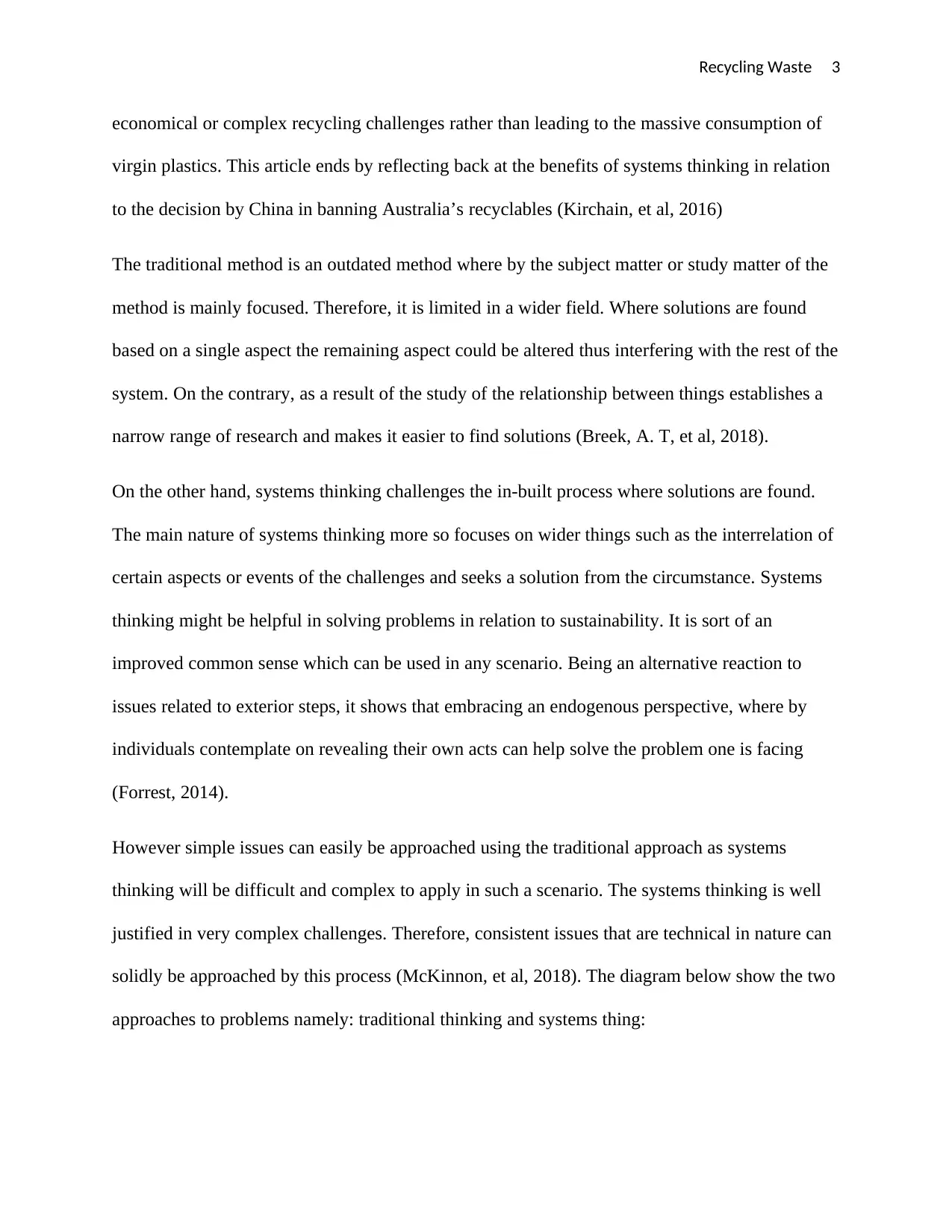
Recycling Waste 3
economical or complex recycling challenges rather than leading to the massive consumption of
virgin plastics. This article ends by reflecting back at the benefits of systems thinking in relation
to the decision by China in banning Australia’s recyclables (Kirchain, et al, 2016)
The traditional method is an outdated method where by the subject matter or study matter of the
method is mainly focused. Therefore, it is limited in a wider field. Where solutions are found
based on a single aspect the remaining aspect could be altered thus interfering with the rest of the
system. On the contrary, as a result of the study of the relationship between things establishes a
narrow range of research and makes it easier to find solutions (Breek, A. T, et al, 2018).
On the other hand, systems thinking challenges the in-built process where solutions are found.
The main nature of systems thinking more so focuses on wider things such as the interrelation of
certain aspects or events of the challenges and seeks a solution from the circumstance. Systems
thinking might be helpful in solving problems in relation to sustainability. It is sort of an
improved common sense which can be used in any scenario. Being an alternative reaction to
issues related to exterior steps, it shows that embracing an endogenous perspective, where by
individuals contemplate on revealing their own acts can help solve the problem one is facing
(Forrest, 2014).
However simple issues can easily be approached using the traditional approach as systems
thinking will be difficult and complex to apply in such a scenario. The systems thinking is well
justified in very complex challenges. Therefore, consistent issues that are technical in nature can
solidly be approached by this process (McKinnon, et al, 2018). The diagram below show the two
approaches to problems namely: traditional thinking and systems thing:
economical or complex recycling challenges rather than leading to the massive consumption of
virgin plastics. This article ends by reflecting back at the benefits of systems thinking in relation
to the decision by China in banning Australia’s recyclables (Kirchain, et al, 2016)
The traditional method is an outdated method where by the subject matter or study matter of the
method is mainly focused. Therefore, it is limited in a wider field. Where solutions are found
based on a single aspect the remaining aspect could be altered thus interfering with the rest of the
system. On the contrary, as a result of the study of the relationship between things establishes a
narrow range of research and makes it easier to find solutions (Breek, A. T, et al, 2018).
On the other hand, systems thinking challenges the in-built process where solutions are found.
The main nature of systems thinking more so focuses on wider things such as the interrelation of
certain aspects or events of the challenges and seeks a solution from the circumstance. Systems
thinking might be helpful in solving problems in relation to sustainability. It is sort of an
improved common sense which can be used in any scenario. Being an alternative reaction to
issues related to exterior steps, it shows that embracing an endogenous perspective, where by
individuals contemplate on revealing their own acts can help solve the problem one is facing
(Forrest, 2014).
However simple issues can easily be approached using the traditional approach as systems
thinking will be difficult and complex to apply in such a scenario. The systems thinking is well
justified in very complex challenges. Therefore, consistent issues that are technical in nature can
solidly be approached by this process (McKinnon, et al, 2018). The diagram below show the two
approaches to problems namely: traditional thinking and systems thing:
⊘ This is a preview!⊘
Do you want full access?
Subscribe today to unlock all pages.

Trusted by 1+ million students worldwide
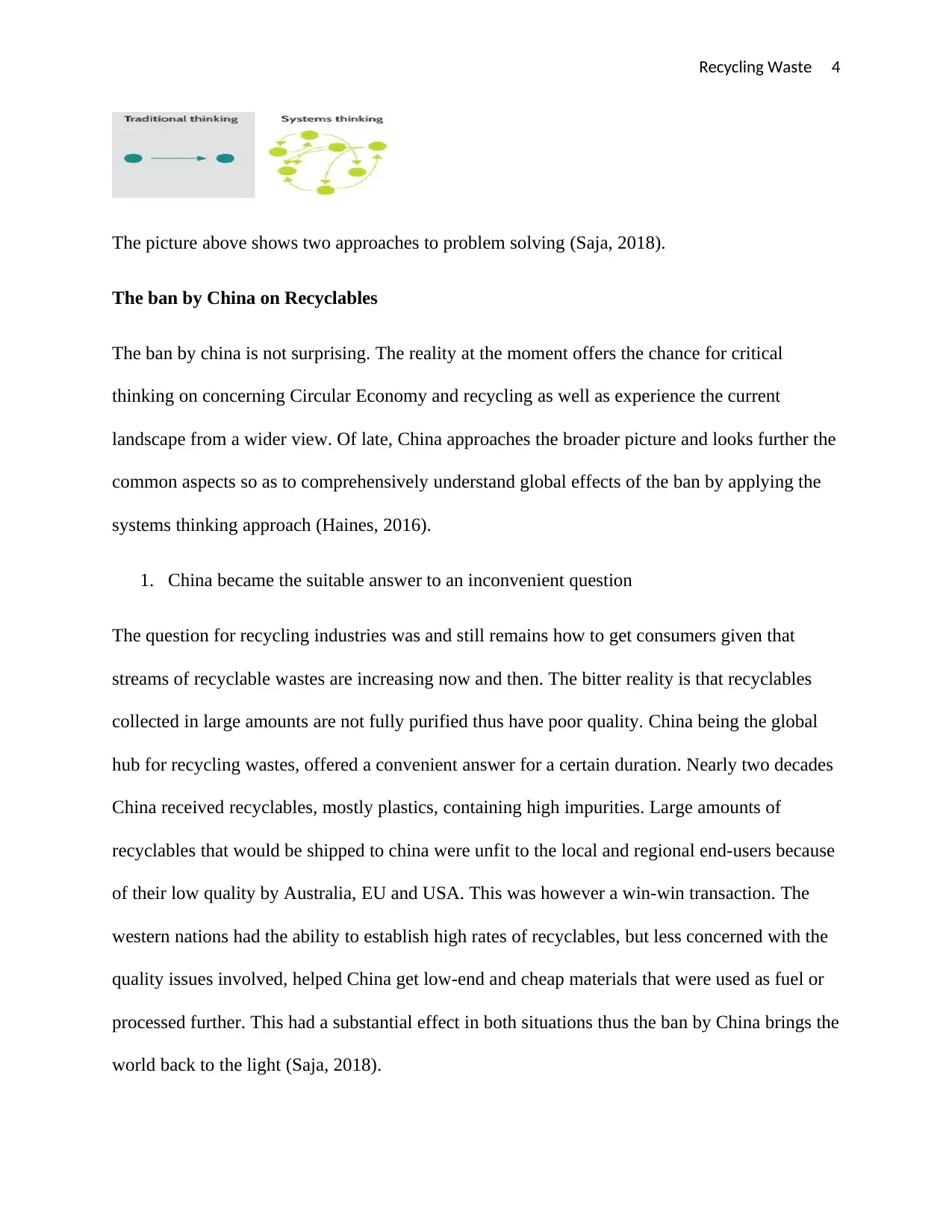
Recycling Waste 4
The picture above shows two approaches to problem solving (Saja, 2018).
The ban by China on Recyclables
The ban by china is not surprising. The reality at the moment offers the chance for critical
thinking on concerning Circular Economy and recycling as well as experience the current
landscape from a wider view. Of late, China approaches the broader picture and looks further the
common aspects so as to comprehensively understand global effects of the ban by applying the
systems thinking approach (Haines, 2016).
1. China became the suitable answer to an inconvenient question
The question for recycling industries was and still remains how to get consumers given that
streams of recyclable wastes are increasing now and then. The bitter reality is that recyclables
collected in large amounts are not fully purified thus have poor quality. China being the global
hub for recycling wastes, offered a convenient answer for a certain duration. Nearly two decades
China received recyclables, mostly plastics, containing high impurities. Large amounts of
recyclables that would be shipped to china were unfit to the local and regional end-users because
of their low quality by Australia, EU and USA. This was however a win-win transaction. The
western nations had the ability to establish high rates of recyclables, but less concerned with the
quality issues involved, helped China get low-end and cheap materials that were used as fuel or
processed further. This had a substantial effect in both situations thus the ban by China brings the
world back to the light (Saja, 2018).
The picture above shows two approaches to problem solving (Saja, 2018).
The ban by China on Recyclables
The ban by china is not surprising. The reality at the moment offers the chance for critical
thinking on concerning Circular Economy and recycling as well as experience the current
landscape from a wider view. Of late, China approaches the broader picture and looks further the
common aspects so as to comprehensively understand global effects of the ban by applying the
systems thinking approach (Haines, 2016).
1. China became the suitable answer to an inconvenient question
The question for recycling industries was and still remains how to get consumers given that
streams of recyclable wastes are increasing now and then. The bitter reality is that recyclables
collected in large amounts are not fully purified thus have poor quality. China being the global
hub for recycling wastes, offered a convenient answer for a certain duration. Nearly two decades
China received recyclables, mostly plastics, containing high impurities. Large amounts of
recyclables that would be shipped to china were unfit to the local and regional end-users because
of their low quality by Australia, EU and USA. This was however a win-win transaction. The
western nations had the ability to establish high rates of recyclables, but less concerned with the
quality issues involved, helped China get low-end and cheap materials that were used as fuel or
processed further. This had a substantial effect in both situations thus the ban by China brings the
world back to the light (Saja, 2018).
Paraphrase This Document
Need a fresh take? Get an instant paraphrase of this document with our AI Paraphraser
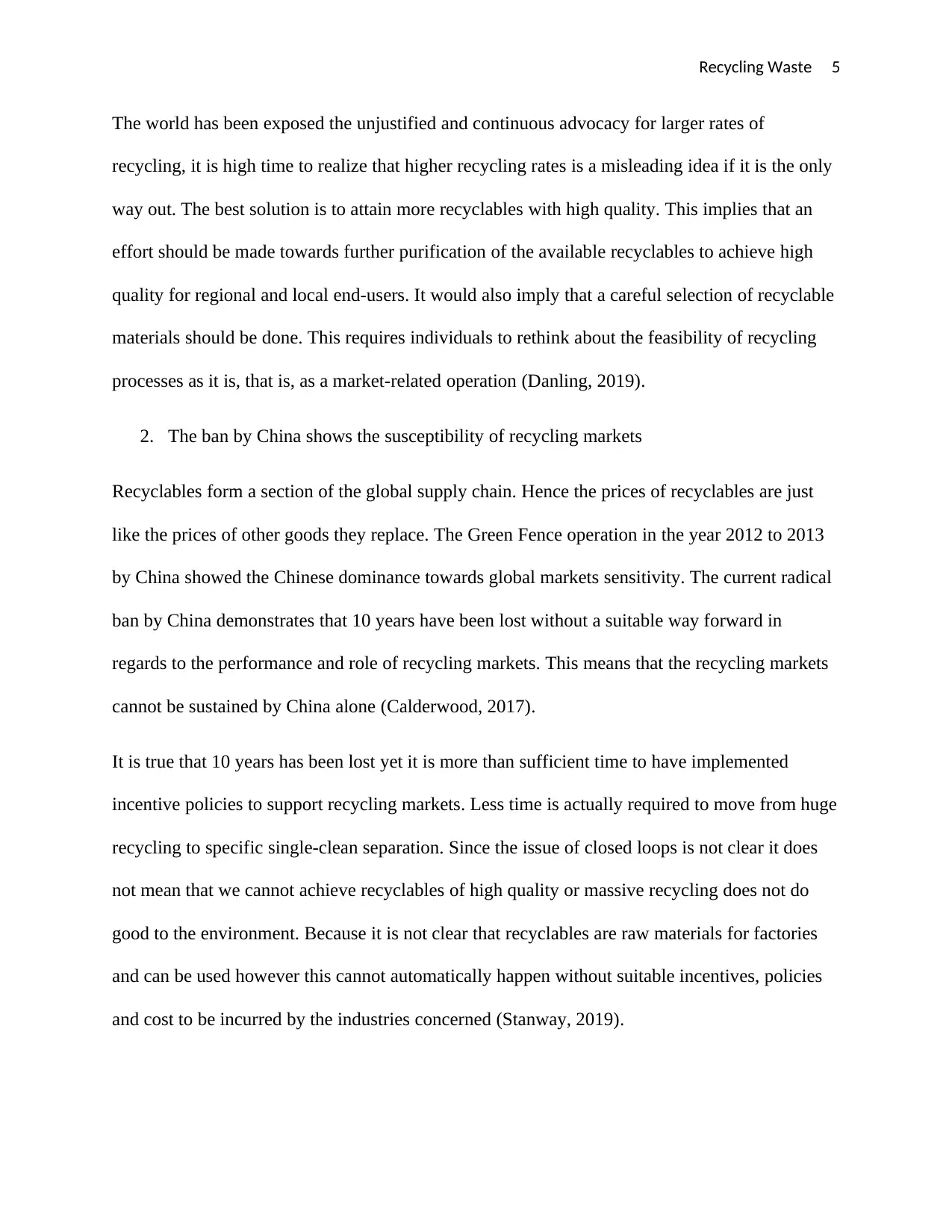
Recycling Waste 5
The world has been exposed the unjustified and continuous advocacy for larger rates of
recycling, it is high time to realize that higher recycling rates is a misleading idea if it is the only
way out. The best solution is to attain more recyclables with high quality. This implies that an
effort should be made towards further purification of the available recyclables to achieve high
quality for regional and local end-users. It would also imply that a careful selection of recyclable
materials should be done. This requires individuals to rethink about the feasibility of recycling
processes as it is, that is, as a market-related operation (Danling, 2019).
2. The ban by China shows the susceptibility of recycling markets
Recyclables form a section of the global supply chain. Hence the prices of recyclables are just
like the prices of other goods they replace. The Green Fence operation in the year 2012 to 2013
by China showed the Chinese dominance towards global markets sensitivity. The current radical
ban by China demonstrates that 10 years have been lost without a suitable way forward in
regards to the performance and role of recycling markets. This means that the recycling markets
cannot be sustained by China alone (Calderwood, 2017).
It is true that 10 years has been lost yet it is more than sufficient time to have implemented
incentive policies to support recycling markets. Less time is actually required to move from huge
recycling to specific single-clean separation. Since the issue of closed loops is not clear it does
not mean that we cannot achieve recyclables of high quality or massive recycling does not do
good to the environment. Because it is not clear that recyclables are raw materials for factories
and can be used however this cannot automatically happen without suitable incentives, policies
and cost to be incurred by the industries concerned (Stanway, 2019).
The world has been exposed the unjustified and continuous advocacy for larger rates of
recycling, it is high time to realize that higher recycling rates is a misleading idea if it is the only
way out. The best solution is to attain more recyclables with high quality. This implies that an
effort should be made towards further purification of the available recyclables to achieve high
quality for regional and local end-users. It would also imply that a careful selection of recyclable
materials should be done. This requires individuals to rethink about the feasibility of recycling
processes as it is, that is, as a market-related operation (Danling, 2019).
2. The ban by China shows the susceptibility of recycling markets
Recyclables form a section of the global supply chain. Hence the prices of recyclables are just
like the prices of other goods they replace. The Green Fence operation in the year 2012 to 2013
by China showed the Chinese dominance towards global markets sensitivity. The current radical
ban by China demonstrates that 10 years have been lost without a suitable way forward in
regards to the performance and role of recycling markets. This means that the recycling markets
cannot be sustained by China alone (Calderwood, 2017).
It is true that 10 years has been lost yet it is more than sufficient time to have implemented
incentive policies to support recycling markets. Less time is actually required to move from huge
recycling to specific single-clean separation. Since the issue of closed loops is not clear it does
not mean that we cannot achieve recyclables of high quality or massive recycling does not do
good to the environment. Because it is not clear that recyclables are raw materials for factories
and can be used however this cannot automatically happen without suitable incentives, policies
and cost to be incurred by the industries concerned (Stanway, 2019).
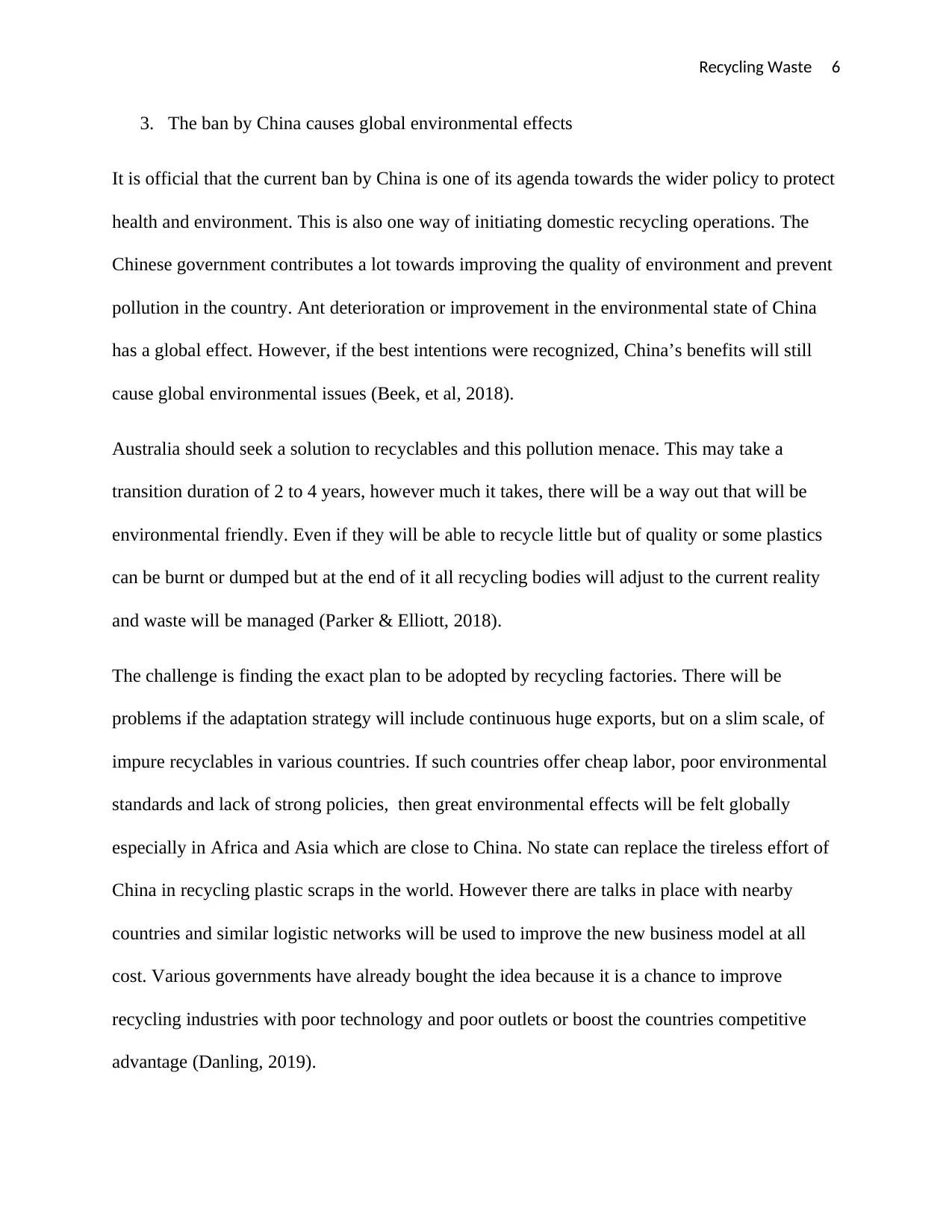
Recycling Waste 6
3. The ban by China causes global environmental effects
It is official that the current ban by China is one of its agenda towards the wider policy to protect
health and environment. This is also one way of initiating domestic recycling operations. The
Chinese government contributes a lot towards improving the quality of environment and prevent
pollution in the country. Ant deterioration or improvement in the environmental state of China
has a global effect. However, if the best intentions were recognized, China’s benefits will still
cause global environmental issues (Beek, et al, 2018).
Australia should seek a solution to recyclables and this pollution menace. This may take a
transition duration of 2 to 4 years, however much it takes, there will be a way out that will be
environmental friendly. Even if they will be able to recycle little but of quality or some plastics
can be burnt or dumped but at the end of it all recycling bodies will adjust to the current reality
and waste will be managed (Parker & Elliott, 2018).
The challenge is finding the exact plan to be adopted by recycling factories. There will be
problems if the adaptation strategy will include continuous huge exports, but on a slim scale, of
impure recyclables in various countries. If such countries offer cheap labor, poor environmental
standards and lack of strong policies, then great environmental effects will be felt globally
especially in Africa and Asia which are close to China. No state can replace the tireless effort of
China in recycling plastic scraps in the world. However there are talks in place with nearby
countries and similar logistic networks will be used to improve the new business model at all
cost. Various governments have already bought the idea because it is a chance to improve
recycling industries with poor technology and poor outlets or boost the countries competitive
advantage (Danling, 2019).
3. The ban by China causes global environmental effects
It is official that the current ban by China is one of its agenda towards the wider policy to protect
health and environment. This is also one way of initiating domestic recycling operations. The
Chinese government contributes a lot towards improving the quality of environment and prevent
pollution in the country. Ant deterioration or improvement in the environmental state of China
has a global effect. However, if the best intentions were recognized, China’s benefits will still
cause global environmental issues (Beek, et al, 2018).
Australia should seek a solution to recyclables and this pollution menace. This may take a
transition duration of 2 to 4 years, however much it takes, there will be a way out that will be
environmental friendly. Even if they will be able to recycle little but of quality or some plastics
can be burnt or dumped but at the end of it all recycling bodies will adjust to the current reality
and waste will be managed (Parker & Elliott, 2018).
The challenge is finding the exact plan to be adopted by recycling factories. There will be
problems if the adaptation strategy will include continuous huge exports, but on a slim scale, of
impure recyclables in various countries. If such countries offer cheap labor, poor environmental
standards and lack of strong policies, then great environmental effects will be felt globally
especially in Africa and Asia which are close to China. No state can replace the tireless effort of
China in recycling plastic scraps in the world. However there are talks in place with nearby
countries and similar logistic networks will be used to improve the new business model at all
cost. Various governments have already bought the idea because it is a chance to improve
recycling industries with poor technology and poor outlets or boost the countries competitive
advantage (Danling, 2019).
⊘ This is a preview!⊘
Do you want full access?
Subscribe today to unlock all pages.

Trusted by 1+ million students worldwide
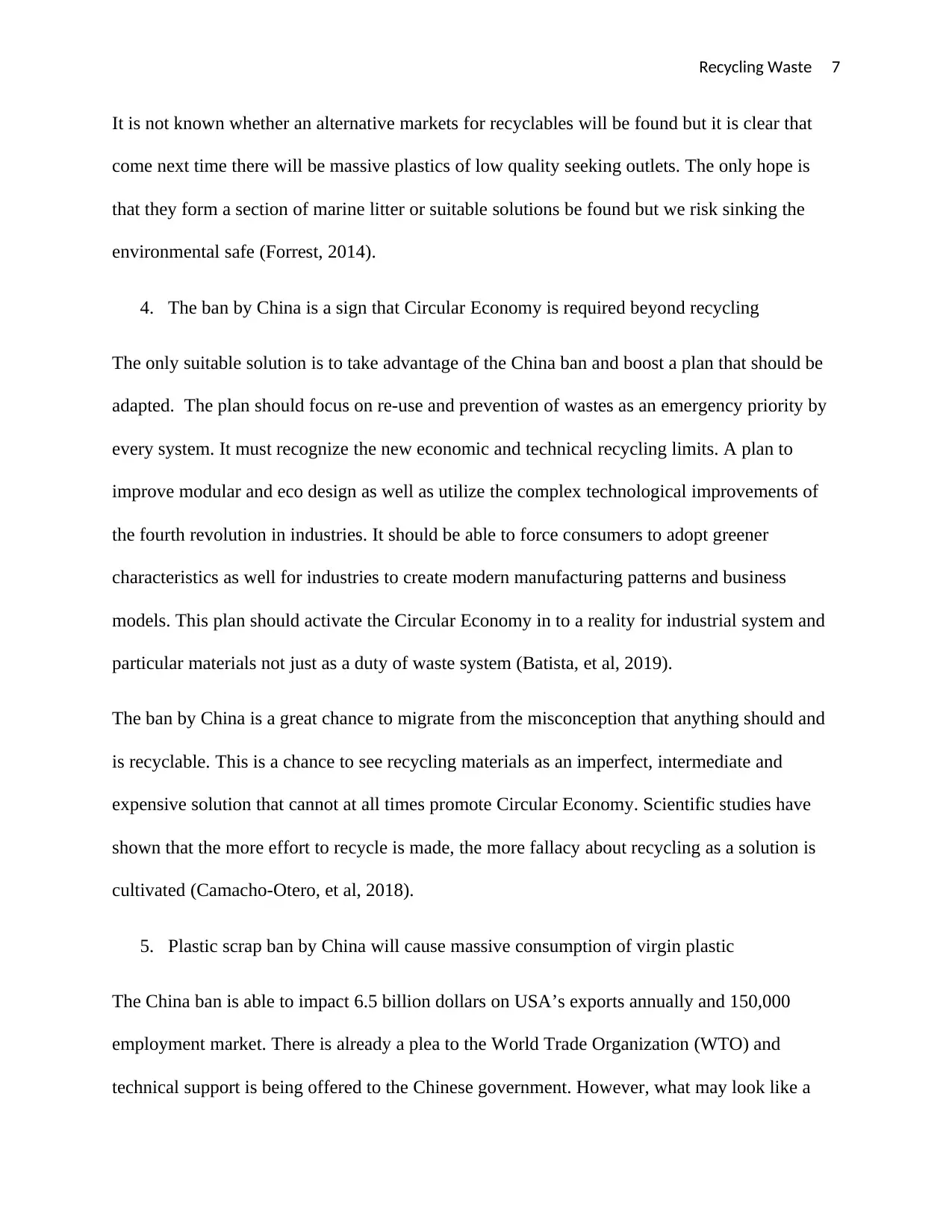
Recycling Waste 7
It is not known whether an alternative markets for recyclables will be found but it is clear that
come next time there will be massive plastics of low quality seeking outlets. The only hope is
that they form a section of marine litter or suitable solutions be found but we risk sinking the
environmental safe (Forrest, 2014).
4. The ban by China is a sign that Circular Economy is required beyond recycling
The only suitable solution is to take advantage of the China ban and boost a plan that should be
adapted. The plan should focus on re-use and prevention of wastes as an emergency priority by
every system. It must recognize the new economic and technical recycling limits. A plan to
improve modular and eco design as well as utilize the complex technological improvements of
the fourth revolution in industries. It should be able to force consumers to adopt greener
characteristics as well for industries to create modern manufacturing patterns and business
models. This plan should activate the Circular Economy in to a reality for industrial system and
particular materials not just as a duty of waste system (Batista, et al, 2019).
The ban by China is a great chance to migrate from the misconception that anything should and
is recyclable. This is a chance to see recycling materials as an imperfect, intermediate and
expensive solution that cannot at all times promote Circular Economy. Scientific studies have
shown that the more effort to recycle is made, the more fallacy about recycling as a solution is
cultivated (Camacho-Otero, et al, 2018).
5. Plastic scrap ban by China will cause massive consumption of virgin plastic
The China ban is able to impact 6.5 billion dollars on USA’s exports annually and 150,000
employment market. There is already a plea to the World Trade Organization (WTO) and
technical support is being offered to the Chinese government. However, what may look like a
It is not known whether an alternative markets for recyclables will be found but it is clear that
come next time there will be massive plastics of low quality seeking outlets. The only hope is
that they form a section of marine litter or suitable solutions be found but we risk sinking the
environmental safe (Forrest, 2014).
4. The ban by China is a sign that Circular Economy is required beyond recycling
The only suitable solution is to take advantage of the China ban and boost a plan that should be
adapted. The plan should focus on re-use and prevention of wastes as an emergency priority by
every system. It must recognize the new economic and technical recycling limits. A plan to
improve modular and eco design as well as utilize the complex technological improvements of
the fourth revolution in industries. It should be able to force consumers to adopt greener
characteristics as well for industries to create modern manufacturing patterns and business
models. This plan should activate the Circular Economy in to a reality for industrial system and
particular materials not just as a duty of waste system (Batista, et al, 2019).
The ban by China is a great chance to migrate from the misconception that anything should and
is recyclable. This is a chance to see recycling materials as an imperfect, intermediate and
expensive solution that cannot at all times promote Circular Economy. Scientific studies have
shown that the more effort to recycle is made, the more fallacy about recycling as a solution is
cultivated (Camacho-Otero, et al, 2018).
5. Plastic scrap ban by China will cause massive consumption of virgin plastic
The China ban is able to impact 6.5 billion dollars on USA’s exports annually and 150,000
employment market. There is already a plea to the World Trade Organization (WTO) and
technical support is being offered to the Chinese government. However, what may look like a
Paraphrase This Document
Need a fresh take? Get an instant paraphrase of this document with our AI Paraphraser
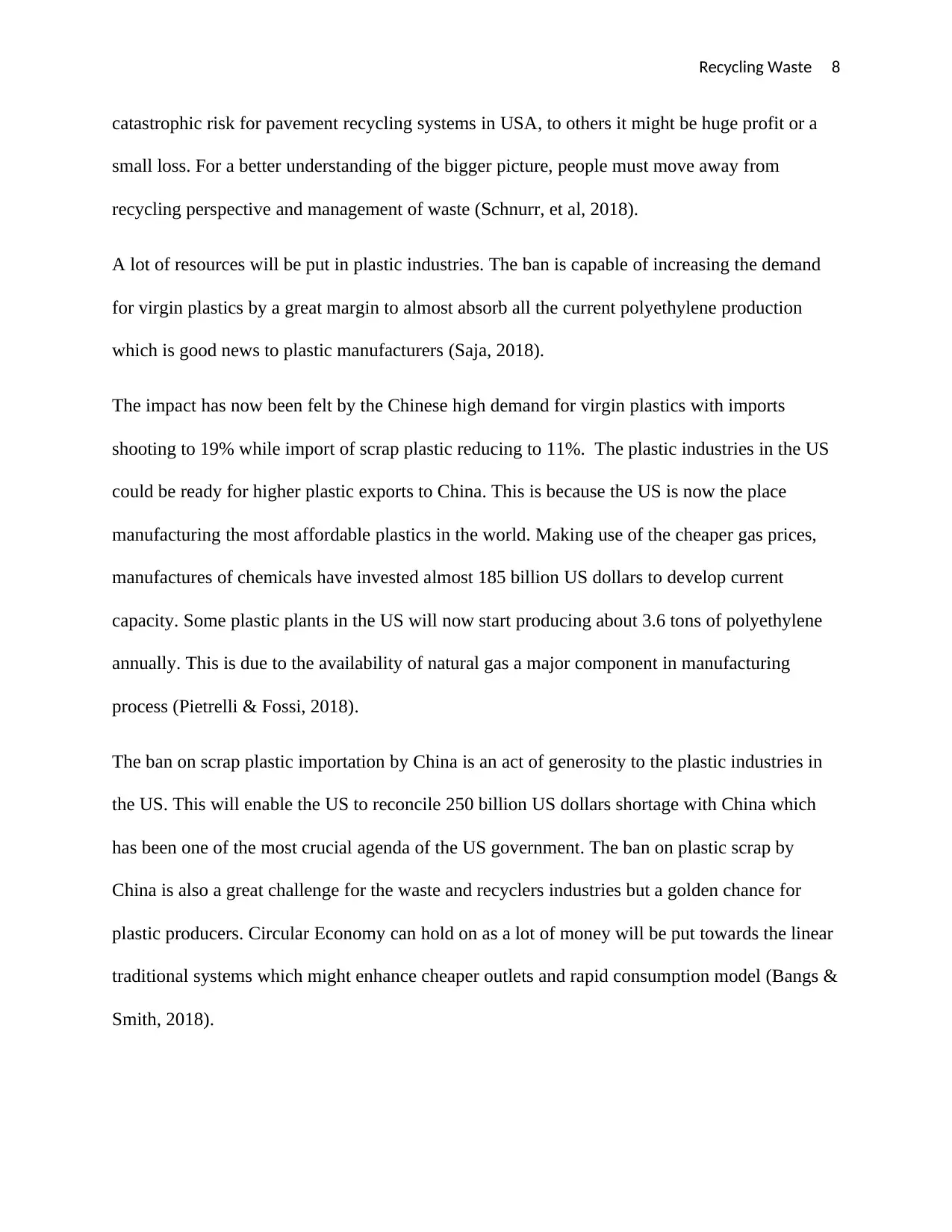
Recycling Waste 8
catastrophic risk for pavement recycling systems in USA, to others it might be huge profit or a
small loss. For a better understanding of the bigger picture, people must move away from
recycling perspective and management of waste (Schnurr, et al, 2018).
A lot of resources will be put in plastic industries. The ban is capable of increasing the demand
for virgin plastics by a great margin to almost absorb all the current polyethylene production
which is good news to plastic manufacturers (Saja, 2018).
The impact has now been felt by the Chinese high demand for virgin plastics with imports
shooting to 19% while import of scrap plastic reducing to 11%. The plastic industries in the US
could be ready for higher plastic exports to China. This is because the US is now the place
manufacturing the most affordable plastics in the world. Making use of the cheaper gas prices,
manufactures of chemicals have invested almost 185 billion US dollars to develop current
capacity. Some plastic plants in the US will now start producing about 3.6 tons of polyethylene
annually. This is due to the availability of natural gas a major component in manufacturing
process (Pietrelli & Fossi, 2018).
The ban on scrap plastic importation by China is an act of generosity to the plastic industries in
the US. This will enable the US to reconcile 250 billion US dollars shortage with China which
has been one of the most crucial agenda of the US government. The ban on plastic scrap by
China is also a great challenge for the waste and recyclers industries but a golden chance for
plastic producers. Circular Economy can hold on as a lot of money will be put towards the linear
traditional systems which might enhance cheaper outlets and rapid consumption model (Bangs &
Smith, 2018).
catastrophic risk for pavement recycling systems in USA, to others it might be huge profit or a
small loss. For a better understanding of the bigger picture, people must move away from
recycling perspective and management of waste (Schnurr, et al, 2018).
A lot of resources will be put in plastic industries. The ban is capable of increasing the demand
for virgin plastics by a great margin to almost absorb all the current polyethylene production
which is good news to plastic manufacturers (Saja, 2018).
The impact has now been felt by the Chinese high demand for virgin plastics with imports
shooting to 19% while import of scrap plastic reducing to 11%. The plastic industries in the US
could be ready for higher plastic exports to China. This is because the US is now the place
manufacturing the most affordable plastics in the world. Making use of the cheaper gas prices,
manufactures of chemicals have invested almost 185 billion US dollars to develop current
capacity. Some plastic plants in the US will now start producing about 3.6 tons of polyethylene
annually. This is due to the availability of natural gas a major component in manufacturing
process (Pietrelli & Fossi, 2018).
The ban on scrap plastic importation by China is an act of generosity to the plastic industries in
the US. This will enable the US to reconcile 250 billion US dollars shortage with China which
has been one of the most crucial agenda of the US government. The ban on plastic scrap by
China is also a great challenge for the waste and recyclers industries but a golden chance for
plastic producers. Circular Economy can hold on as a lot of money will be put towards the linear
traditional systems which might enhance cheaper outlets and rapid consumption model (Bangs &
Smith, 2018).
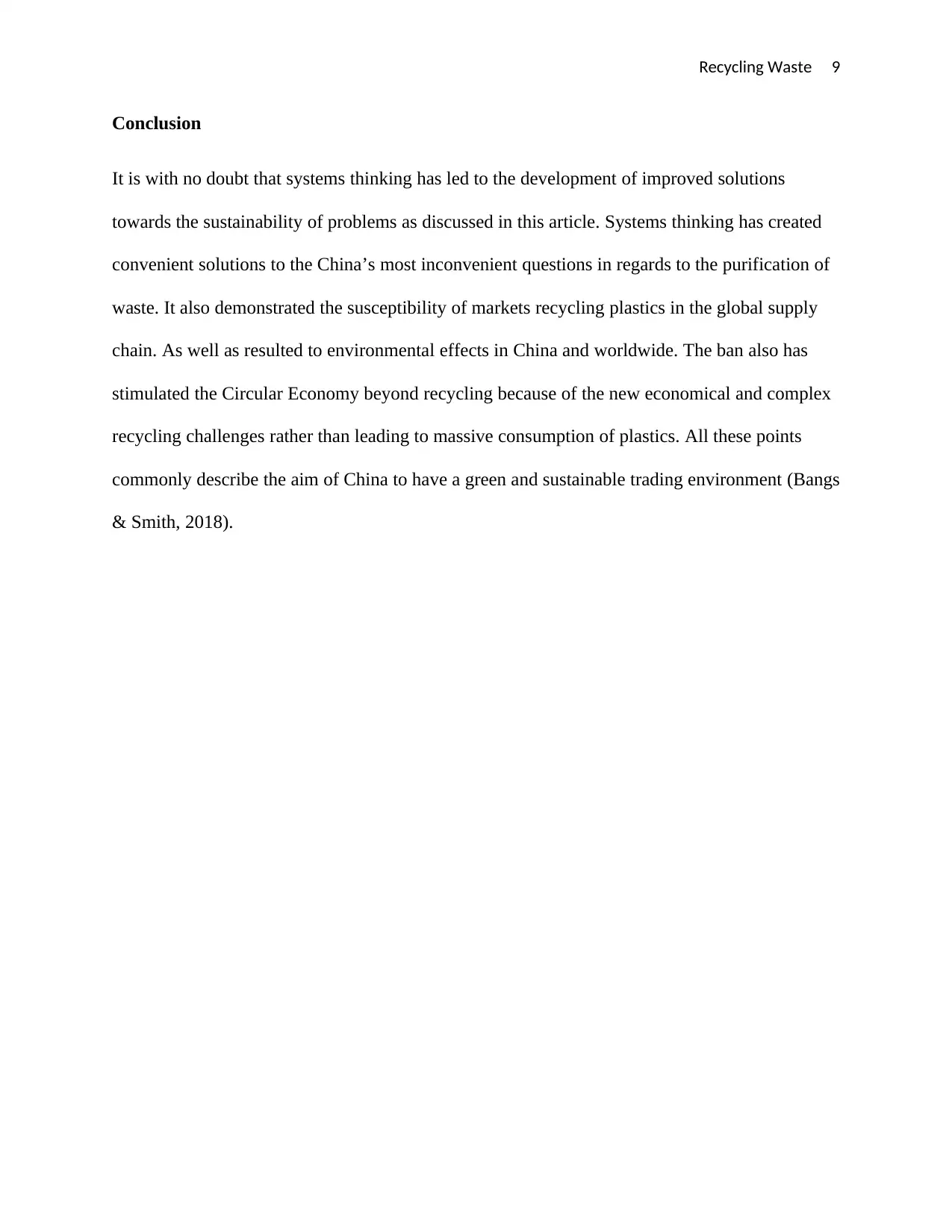
Recycling Waste 9
Conclusion
It is with no doubt that systems thinking has led to the development of improved solutions
towards the sustainability of problems as discussed in this article. Systems thinking has created
convenient solutions to the China’s most inconvenient questions in regards to the purification of
waste. It also demonstrated the susceptibility of markets recycling plastics in the global supply
chain. As well as resulted to environmental effects in China and worldwide. The ban also has
stimulated the Circular Economy beyond recycling because of the new economical and complex
recycling challenges rather than leading to massive consumption of plastics. All these points
commonly describe the aim of China to have a green and sustainable trading environment (Bangs
& Smith, 2018).
Conclusion
It is with no doubt that systems thinking has led to the development of improved solutions
towards the sustainability of problems as discussed in this article. Systems thinking has created
convenient solutions to the China’s most inconvenient questions in regards to the purification of
waste. It also demonstrated the susceptibility of markets recycling plastics in the global supply
chain. As well as resulted to environmental effects in China and worldwide. The ban also has
stimulated the Circular Economy beyond recycling because of the new economical and complex
recycling challenges rather than leading to massive consumption of plastics. All these points
commonly describe the aim of China to have a green and sustainable trading environment (Bangs
& Smith, 2018).
⊘ This is a preview!⊘
Do you want full access?
Subscribe today to unlock all pages.

Trusted by 1+ million students worldwide
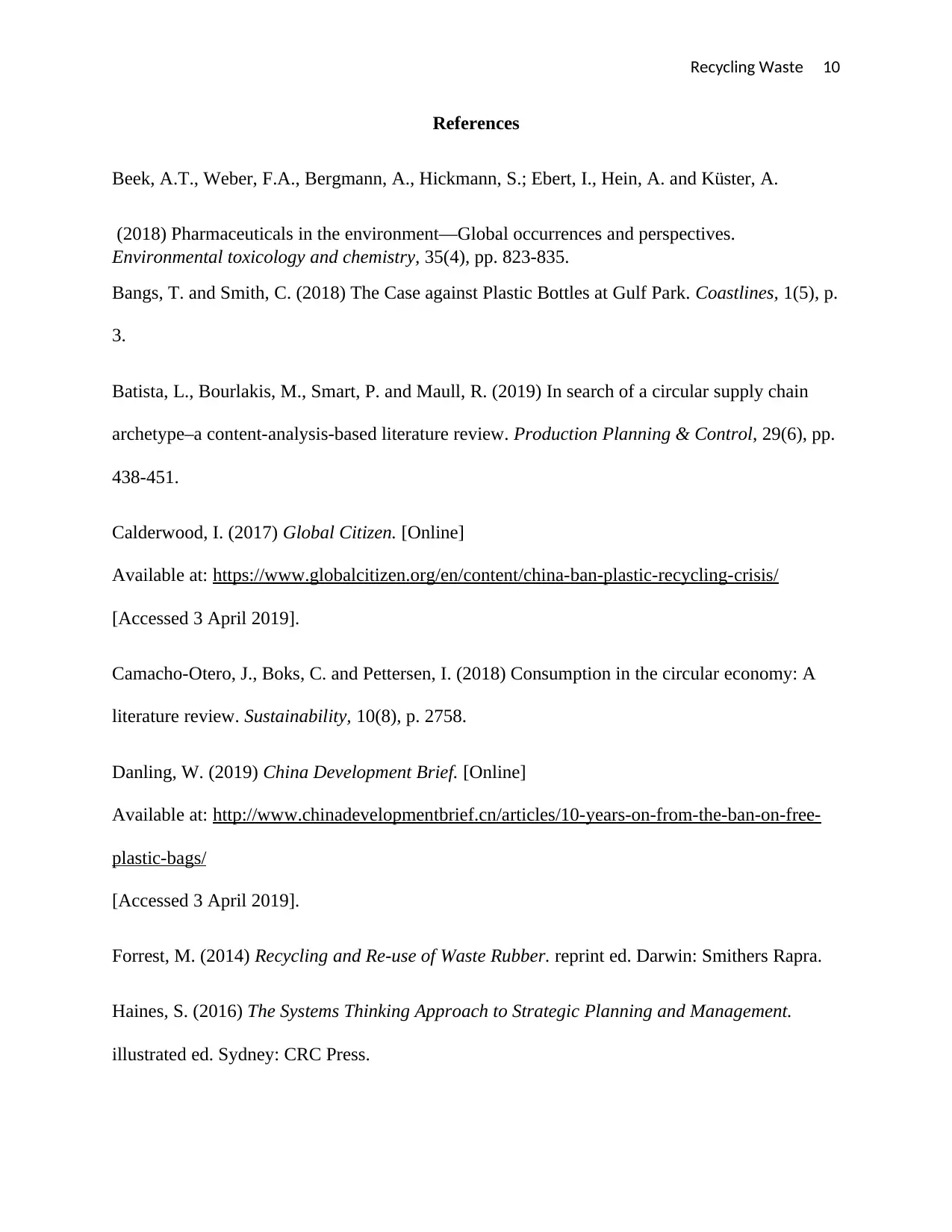
Recycling Waste 10
References
Beek, A.T., Weber, F.A., Bergmann, A., Hickmann, S.; Ebert, I., Hein, A. and Küster, A.
(2018) Pharmaceuticals in the environment—Global occurrences and perspectives.
Environmental toxicology and chemistry, 35(4), pp. 823-835.
Bangs, T. and Smith, C. (2018) The Case against Plastic Bottles at Gulf Park. Coastlines, 1(5), p.
3.
Batista, L., Bourlakis, M., Smart, P. and Maull, R. (2019) In search of a circular supply chain
archetype–a content-analysis-based literature review. Production Planning & Control, 29(6), pp.
438-451.
Calderwood, I. (2017) Global Citizen. [Online]
Available at: https://www.globalcitizen.org/en/content/china-ban-plastic-recycling-crisis/
[Accessed 3 April 2019].
Camacho-Otero, J., Boks, C. and Pettersen, I. (2018) Consumption in the circular economy: A
literature review. Sustainability, 10(8), p. 2758.
Danling, W. (2019) China Development Brief. [Online]
Available at: http://www.chinadevelopmentbrief.cn/articles/10-years-on-from-the-ban-on-free-
plastic-bags/
[Accessed 3 April 2019].
Forrest, M. (2014) Recycling and Re-use of Waste Rubber. reprint ed. Darwin: Smithers Rapra.
Haines, S. (2016) The Systems Thinking Approach to Strategic Planning and Management.
illustrated ed. Sydney: CRC Press.
References
Beek, A.T., Weber, F.A., Bergmann, A., Hickmann, S.; Ebert, I., Hein, A. and Küster, A.
(2018) Pharmaceuticals in the environment—Global occurrences and perspectives.
Environmental toxicology and chemistry, 35(4), pp. 823-835.
Bangs, T. and Smith, C. (2018) The Case against Plastic Bottles at Gulf Park. Coastlines, 1(5), p.
3.
Batista, L., Bourlakis, M., Smart, P. and Maull, R. (2019) In search of a circular supply chain
archetype–a content-analysis-based literature review. Production Planning & Control, 29(6), pp.
438-451.
Calderwood, I. (2017) Global Citizen. [Online]
Available at: https://www.globalcitizen.org/en/content/china-ban-plastic-recycling-crisis/
[Accessed 3 April 2019].
Camacho-Otero, J., Boks, C. and Pettersen, I. (2018) Consumption in the circular economy: A
literature review. Sustainability, 10(8), p. 2758.
Danling, W. (2019) China Development Brief. [Online]
Available at: http://www.chinadevelopmentbrief.cn/articles/10-years-on-from-the-ban-on-free-
plastic-bags/
[Accessed 3 April 2019].
Forrest, M. (2014) Recycling and Re-use of Waste Rubber. reprint ed. Darwin: Smithers Rapra.
Haines, S. (2016) The Systems Thinking Approach to Strategic Planning and Management.
illustrated ed. Sydney: CRC Press.
Paraphrase This Document
Need a fresh take? Get an instant paraphrase of this document with our AI Paraphraser
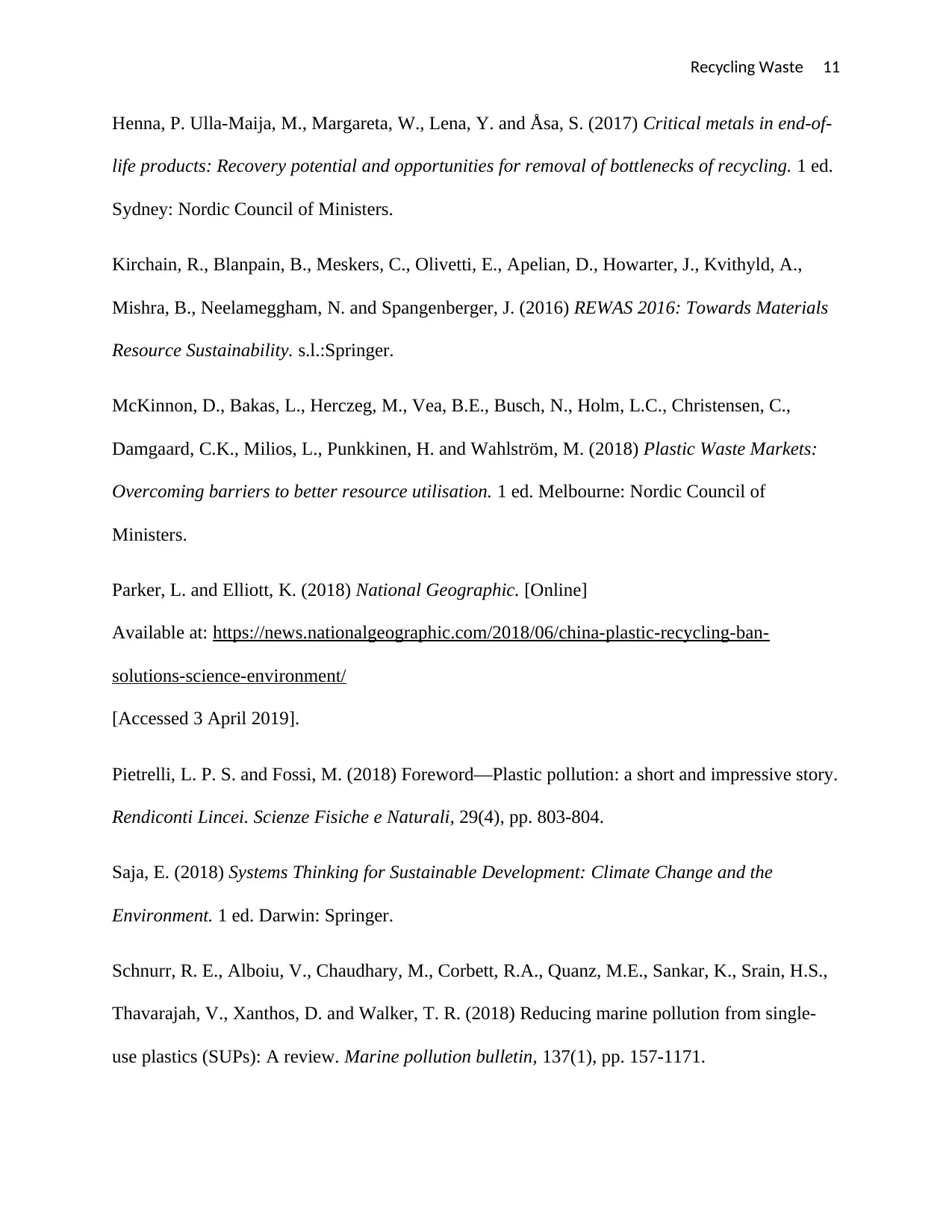
Recycling Waste 11
Henna, P. Ulla-Maija, M., Margareta, W., Lena, Y. and Åsa, S. (2017) Critical metals in end-of-
life products: Recovery potential and opportunities for removal of bottlenecks of recycling. 1 ed.
Sydney: Nordic Council of Ministers.
Kirchain, R., Blanpain, B., Meskers, C., Olivetti, E., Apelian, D., Howarter, J., Kvithyld, A.,
Mishra, B., Neelameggham, N. and Spangenberger, J. (2016) REWAS 2016: Towards Materials
Resource Sustainability. s.l.:Springer.
McKinnon, D., Bakas, L., Herczeg, M., Vea, B.E., Busch, N., Holm, L.C., Christensen, C.,
Damgaard, C.K., Milios, L., Punkkinen, H. and Wahlström, M. (2018) Plastic Waste Markets:
Overcoming barriers to better resource utilisation. 1 ed. Melbourne: Nordic Council of
Ministers.
Parker, L. and Elliott, K. (2018) National Geographic. [Online]
Available at: https://news.nationalgeographic.com/2018/06/china-plastic-recycling-ban-
solutions-science-environment/
[Accessed 3 April 2019].
Pietrelli, L. P. S. and Fossi, M. (2018) Foreword—Plastic pollution: a short and impressive story.
Rendiconti Lincei. Scienze Fisiche e Naturali, 29(4), pp. 803-804.
Saja, E. (2018) Systems Thinking for Sustainable Development: Climate Change and the
Environment. 1 ed. Darwin: Springer.
Schnurr, R. E., Alboiu, V., Chaudhary, M., Corbett, R.A., Quanz, M.E., Sankar, K., Srain, H.S.,
Thavarajah, V., Xanthos, D. and Walker, T. R. (2018) Reducing marine pollution from single-
use plastics (SUPs): A review. Marine pollution bulletin, 137(1), pp. 157-1171.
Henna, P. Ulla-Maija, M., Margareta, W., Lena, Y. and Åsa, S. (2017) Critical metals in end-of-
life products: Recovery potential and opportunities for removal of bottlenecks of recycling. 1 ed.
Sydney: Nordic Council of Ministers.
Kirchain, R., Blanpain, B., Meskers, C., Olivetti, E., Apelian, D., Howarter, J., Kvithyld, A.,
Mishra, B., Neelameggham, N. and Spangenberger, J. (2016) REWAS 2016: Towards Materials
Resource Sustainability. s.l.:Springer.
McKinnon, D., Bakas, L., Herczeg, M., Vea, B.E., Busch, N., Holm, L.C., Christensen, C.,
Damgaard, C.K., Milios, L., Punkkinen, H. and Wahlström, M. (2018) Plastic Waste Markets:
Overcoming barriers to better resource utilisation. 1 ed. Melbourne: Nordic Council of
Ministers.
Parker, L. and Elliott, K. (2018) National Geographic. [Online]
Available at: https://news.nationalgeographic.com/2018/06/china-plastic-recycling-ban-
solutions-science-environment/
[Accessed 3 April 2019].
Pietrelli, L. P. S. and Fossi, M. (2018) Foreword—Plastic pollution: a short and impressive story.
Rendiconti Lincei. Scienze Fisiche e Naturali, 29(4), pp. 803-804.
Saja, E. (2018) Systems Thinking for Sustainable Development: Climate Change and the
Environment. 1 ed. Darwin: Springer.
Schnurr, R. E., Alboiu, V., Chaudhary, M., Corbett, R.A., Quanz, M.E., Sankar, K., Srain, H.S.,
Thavarajah, V., Xanthos, D. and Walker, T. R. (2018) Reducing marine pollution from single-
use plastics (SUPs): A review. Marine pollution bulletin, 137(1), pp. 157-1171.

Recycling Waste 12
Stanway, D. (2019) Reuters. [Online]
Available at: https://www.reuters.com/article/us-china-environment-plastic/chinas-hainan-to-
ban-single-use-plastics-by-2025-state-media-idUSKCN1QB013
[Accessed 3 April 2019].
Stanway, D. (2019) Reuters. [Online]
Available at: https://www.reuters.com/article/us-china-environment-plastic/chinas-hainan-to-
ban-single-use-plastics-by-2025-state-media-idUSKCN1QB013
[Accessed 3 April 2019].
⊘ This is a preview!⊘
Do you want full access?
Subscribe today to unlock all pages.

Trusted by 1+ million students worldwide
1 out of 12
Related Documents
Your All-in-One AI-Powered Toolkit for Academic Success.
+13062052269
info@desklib.com
Available 24*7 on WhatsApp / Email
![[object Object]](/_next/static/media/star-bottom.7253800d.svg)
Unlock your academic potential
Copyright © 2020–2026 A2Z Services. All Rights Reserved. Developed and managed by ZUCOL.





